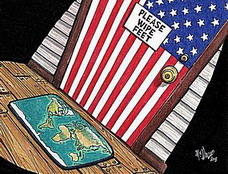
2005-08-26
This Jesus Guy

2005-08-24
Pat Robertson: "Take Him Out"
Donald Rumsfeld weakly dismissed Robertson's hateful incitement: "Private citizens say all kinds of things all the time." But Pat Robertson is no mere private citizen. He was a candidate for the position of Republican Presidential Nominee in 1988. He is a vocal religious leader and broadcaster. He has access to both the electorate and government, and his comments should be held to a higher standard of scrutiny.
"If he thinks we're trying to assassinate him, I think that we really ought to go ahead and do it"
"We have the ability to take him out and I think the time has come that we exercise that ability. We don't need another 200 billion dollar war to get rid of one, you know, strong arm dictator. It's a whole lot easier to have some of the covert operatives do the job and get it over with."
I wonder if Rumsfeld would be similarly dismissive of an American broadcast by a Moslem cleric waxing homicidally about the British Prime Minister. Incidentally, Tony Blair outlined his government's response to those "fostering hatred, advocating violence to further a person's beliefs, or justifying or validating such violence": deportation and exclusion, imprisonment for British nationals, or even stripping citizenship.
Whether it is Pat Robertson or my hypothetical Moslem cleric who calls for the assassination of a head of state, he should be unambiguously reprimanded and distanced by the Administration; his telecast, as Jesse Jackson has suggested, should be investigated by the FCC; and his comments should be reviewed by the authorities to determine whether they are criminal. Anything less would be transparently hypocritical.
POST SCRIPT
Take another look at Robertson's comments, and you will see a couple of implicit assumptions that no one has yet commented on. First, that the $200b invasion of Iraq was mounted to depose a strong arm dictator. Second, that the US has the capacity to assassinate a head of state with covert operatives, suggesting it may have exercised that capacity in the past.
2005-08-12
Dick Dearlove
So, to the pantheon of fictional MI6 names like Honey Ryder, Plenty O'Toole, Xenia Onatopp, and Pussy Galore, add the real-life risque moniker of Dick Dearlove.
By the way, I know it's old news, but you should read the memo in its entirety to see how deliberately the US and UK manufactured a pre-text for invasion.
2005-08-10
Softheaded Lumber Dispute
The US has repeatedly shown that international law applies only to other nations, not to itself. Got a problem with holding and interrogating prisoners illegally in Guantanamo? Too bad. Maybe you expect an apology for the killing of hundreds of thousands of non-comabatants 60 years ago this week in Japan? Not likely.
In a monopolar world with a lone superpower, only other nations must trade freely. Only other nations can be held to account for war crimes. Only other nations can be prevented from acquiring, testing, stockpiling, and tactically using weapons of mass destruction. Only other nations are thieving, or wrong, or menacing, or evil.
If you're not with the US, you're irrelevant. Or worse: you're fodder.
2005-08-07
Foreign Exchange
And Friday on Foreign Exchange with Fareed Zakaria, Zakaria asks whether "in all fairness" to the Bush II administration, that Bush's "standing up" to regional strongmen in the name of democracy ought to be viewed positively by Arabs. At the other extreme, reported by journalist Yaroslav Trofimov, are those Arabs who perceive American incursions into the region as genocide against Moslems.
I was surprised at the tone of the conversation. It seems apparent that the US's designs are neither the dissemination of democracy, nor the eradication of Moslems, but the extension of its empire: securing the resources needed to fill its gaping maw, and securing leadership compliant to its needs. Any resemblances to democracy or accumulating corpses that occur as a consequence are purely incidental.
 This point is probably best illustrated by the strangest of bedfellows: the US and the Kingdom of Saudi Arabia. These countries have enjoyed a healthy political, economic, and military intimacy for decades that was only briefly interrupted by a spat in 1973. Each country harbours, nurtures, and manipulates religious fundamentalists. Each country tolerates the moral excesses of the other. Each country funds terror abroad while publicly denouncing it, in turn making itself a target of terror.
This point is probably best illustrated by the strangest of bedfellows: the US and the Kingdom of Saudi Arabia. These countries have enjoyed a healthy political, economic, and military intimacy for decades that was only briefly interrupted by a spat in 1973. Each country harbours, nurtures, and manipulates religious fundamentalists. Each country tolerates the moral excesses of the other. Each country funds terror abroad while publicly denouncing it, in turn making itself a target of terror.These contradictions are a consequence of 20th century imperialism, and the concordance of the interests of statesmen with those of the corporations they serve.
Further reading:
- "Briefing Depicted Saudis as Enemies," washingtonpost.com, August 6, 2002
- "It's Imperialism Stupid," Noam Chomsky, July 5, 2005
2005-08-05
BCN5: Old Favourites
 We woke up at 1230h; bit of a late start. We had to rush to get to Cal Pep's in time for opening. Arriving at 1325h, before the metal roll shutter goes up, you are virtually guaranteed a seat at the counter. Ten minutes later, and you're out of luck.
We woke up at 1230h; bit of a late start. We had to rush to get to Cal Pep's in time for opening. Arriving at 1325h, before the metal roll shutter goes up, you are virtually guaranteed a seat at the counter. Ten minutes later, and you're out of luck.We sat at Paco's station again and had vi blanc with our gamba fritas, pulpitos (shown), baby clams, artichoke hearts, garbanzos with spinach and jamon, and finally botifarra blanc with liver and port sauce. Crema catalana to finish. What a heady, delicious meal.
Pep wasn't mannning the fryer and griddle today, he was working the room. Not much hissing. Just great food.
When we returned to the flat, we noticed that the corner of Carrer del Rec and Passeig del Born is more lively at 3 in the morning than 3 in the afternoon.
 Off to Park Guell, another Gaudi joint. The Park amply displays Gaudi's flair for naturalism despite his careful attention to design. His creations here are inspired by, adapted from, and complementary to nature. The Seussian swirls topping some of his columns, the heaps of stone loosely forming others, everywhere were rough and irregular surfaces begging to be touched. Many people--myself included--did just that, feeling their way through the park.
Off to Park Guell, another Gaudi joint. The Park amply displays Gaudi's flair for naturalism despite his careful attention to design. His creations here are inspired by, adapted from, and complementary to nature. The Seussian swirls topping some of his columns, the heaps of stone loosely forming others, everywhere were rough and irregular surfaces begging to be touched. Many people--myself included--did just that, feeling their way through the park.We made a short, somewhat unrewarding visit to the Palau de la Musica Catalanya as it was closed to touring visitors and cameras, and as the light was failing by the time we arrived. We'll return in a few days for a chamber music recital.
2005-08-04
Digital Art
I came across an artist's site that intrigued me. Jason Salavon uses his digital tools to render striking commentaries on our culture. He applies statistical analysis to pop culture images and produces works that average multiple images into a single composite, average a single image into a single color, display data points as three-dimensional bursts of color, and other manipulations.
The result is an elegant display of the monotony of our culture, as in 100 Special Moments, described here by the artist:
Each of these works utilizes 100 unique commemorative photographs culled from the internet. The final compositions are arrived at using both the mean and the median, splitting the difference between a specific norm and an ideal one.

The four panels of this work show 4 archetypal commemorative photos: Newlyweds, Little Leaguer, Kids With Santa, and The Graduate (shown). It strikes me as profoundly sad that so many of us follow the same path depicted in these photos, a well-trodden path that must constrain and limit those who take it. And yet, as a father, I fear my children straying from this path into the unknown.
In The Grand Unification Theory (Part One: Every Second of Star Wars), Salavon captures one frame per second of Star Wars and arranges them on a grid by luminosity. The series of images ceases to be a narrative and is merely an abstraction, but relies on the iconic imagery of one of the most popular movies of all time for its elements. Shown below are overall views and deatil views. Snow White, It's a Wonderful Life, and Deep Throat are given the same treatment.


Salavon does not use his digital tools to present dubious simulacra of the real. Rather he presents us with the banality of the digital, pixelating and deconstructing these images from popular culture, then rearranging them into haunting abstractions.
Here's a link to the bibliography at Salavon's site for further reading, including a selected blogospherography
2005-08-02
LoFi
 Wired magazine ran a blurb caled the Digital Devolution about the trend toward decreasing music quality with the imposition of digital limitations on analog sound. The devolution starts in the studio and continues on through recording media, compact discs, mp3s, sound cards, and speakers to render sound that is an approximation rather than a reproduction of the original.
Wired magazine ran a blurb caled the Digital Devolution about the trend toward decreasing music quality with the imposition of digital limitations on analog sound. The devolution starts in the studio and continues on through recording media, compact discs, mp3s, sound cards, and speakers to render sound that is an approximation rather than a reproduction of the original.SACD and DVD-A formats will never be broadly embraced in a marketplace where portability trumps fidelity. Why would anyone upgrade their music collection from CDs to these or other hifi formats when they rip them with lossy compression and listen to them on earbuds?
I have no mp3 player. It is no great loss. My car or home stereo puts any portable listening device to shame. I never watch movies on airplanes because the sound and picture are too crappy for me to enjoy the experience. I'll take a book--an ink and paper analog book, mind you--over any other portable media.
2005-08-01
Selling Sickness
In 1998, Lilly, one of the world's largest pharmaceutical companies, was on the verge of losing its patent on fluoxetine (more commonly known as Prozac) worth over $2 billion annually. However, if Lilly could find a new use for the drug, the patent could be extended. That year, Lilly helped fund a "roundtable" of researchers to gather in Washington D.C., along with staff from the Food and Drug Administration to discuss a scientifically controversial condition called "premenstrual dysphoric disorder" (PMDD), which had only recently, and after much controversy, been included in the appendix of the Diagnostic and Statistical Manual—the bible of psychiatric disorders—as a disorder "under evaluation." But the Lilly-funded researchers soon published an article in a small medical journal suggesting, falsely, that the debate was over and that PMDD could now be considered a "distinct clinical entity," distinct from the stress and tension that can accompany ordinary PMS.
Lilly has not said what role it played in turning the "roundtable" into a journal article, but by 1999, the article helped convince the FDA to approve the use of fluoxetine to treat PMDD—and extended the patent until 2007. Lilly simply repackaged the drug in lavender pill-form, renamed it Serafem, and began marketing it to women. Never mind that independent researchers questioned whether PMDD even existed as a condition. Never mind that Europe's drug regulators raised serious questions about PMDD and criticized Lilly's clinical trials that purported to show the benefits of Serafem. Never mind that even the industry-friendly FDA was appalled at Lilly's television ads, with their too-vague tagline: "Think it's PMS? It could be PMDD."
Further reading:
• Marcia Angell's The Truth About Drug Companies